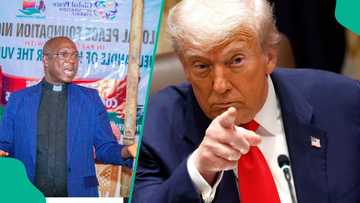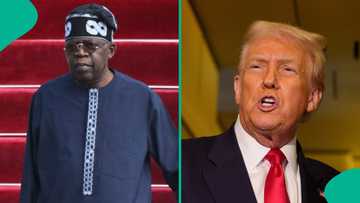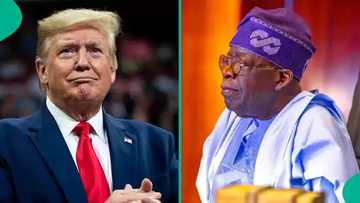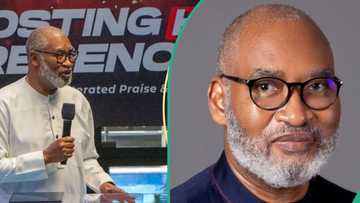Future-Proofing Nigeria Against the Deeper Stakes of Trump’s Bombast
Editor’s note: In this piece, Lekan Olayiwola, a peace and conflict policy analyst, looks at how President Trump’s claim of a “Christian genocide” tests Nigeria’s unity, economy, and regional influence. He outlines steps for safeguarding the nation’s stability and leadership.
The urgent task before President Tinubu in the face of President Trump’s “guns-a-blazing” threat over what he called a “Christian genocide” is to build a Nigeria that no foreign bombast, Trump’s or anyone else’s, can destabilise. While critics dismissed it as another outburst from an unstable politician, beneath the bluster lies something far more consequential: Nigeria’s sovereignty, regional credibility, economic stability, and internal cohesion are all on the line.
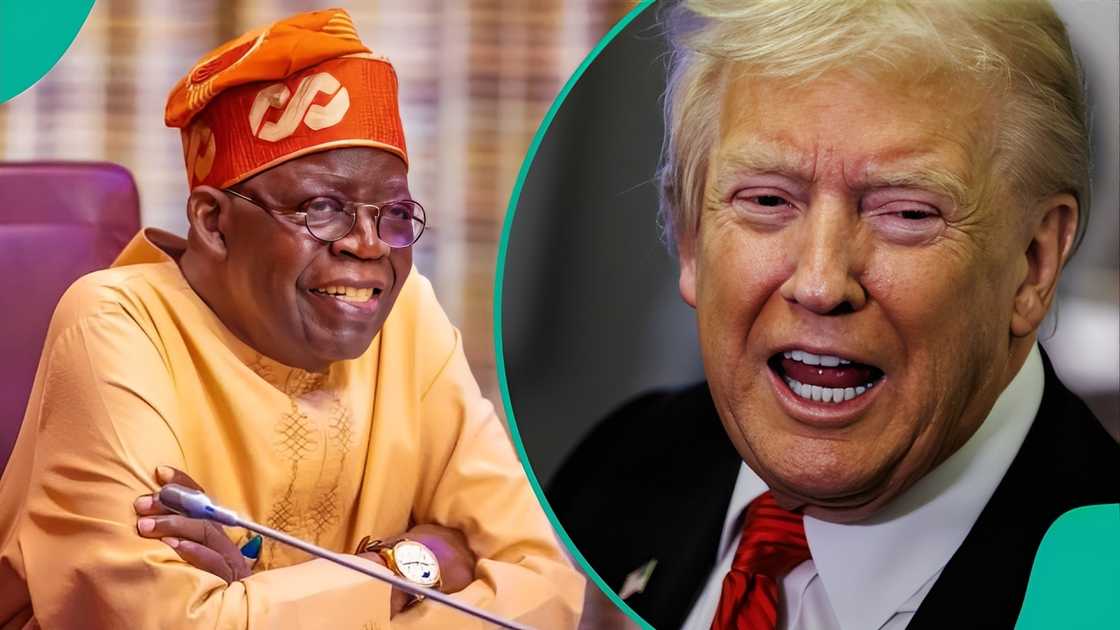
Source: Getty Images
This is not only about the United States or one man’s bombast. It is about how Nigeria defines itself in a volatile world, whether as a nation that reacts to others or one that commands its own story. Beyond the noise, this episode offers a mirror on how secure Nigeria is and how ready we are to defend it without losing our balance.
A nation in a global crossfire
For decades, Nigeria has been West Africa’s stabiliser, providing nearly 70 % of ECOWAS funding, leading peacekeeping missions from Liberia to The Gambia, and hosting over 3 million refugees and migrants from neighbouring states. But external narratives can redraw that leadership overnight.
When a U.S. president describes Nigeria as a site of religious cleansing, the consequences ripple far beyond social media. Western investors read it as instability. Neighbouring states read it as a risk. The average Nigerian reads it as an insult or validation, depending on which side of the country they come from. Suddenly, a careless sentence becomes a strategic earthquake.
Shaking regional foundations
Nigeria’s neighbours are listening closely. In the Republic of Benin, where Christians form about 52 % of the population, Trump’s language stirs unease about Nigeria’s north-west insurgency that occasionally spills over their borders. In Niger Republic, which is over 95 % Muslim, the same statement feeds suspicion of Western “protection” narratives, reinforcing a pivot toward Moscow and away from Abuja.
Trade and integration are also at stake. According to IntelPoint, Nigeria’s exports to ECOWAS countries nearly doubled between 2019 and 2025, rising from 34.2 % to 62.1 % of its intra-African exports. That progress depends on regional trust. If neighbours begin to see Nigeria as a potential flashpoint of faith-based conflict, they will quietly reroute supply chains, border cooperation and security partnerships. The damage would be silent but severe: lost jobs, weaker trade corridors and declining regional goodwill, which are the very foundations of Nigeria’s soft power.
Pivoting east, losing leverage
Whenever Washington threatens sanctions or military pressure, Nigeria instinctively looks East to Beijing or Moscow for leverage. But diversification can quickly become dependency in another form.
Rebutting Trump’s “genocide” claim was firm and necessary. Yet trust once lost is slow to rebuild. Development finance and security assistance may continue, but under tougher conditions. Human-rights clauses get inserted, aid becomes more conditional, and security intelligence flows slow down.
Meanwhile, courting Russia or China may appear pragmatic, but it dilutes Nigeria’s bargaining power with the West and risks entanglement in opaque deals. According to Reuters, Nigeria posted a US$6.83 billion balance-of-payments surplus, signalling tentative recovery. That stability could unravel if geopolitical realignment spooks investors or complicates credit access. The lesson is simple: sovereignty without strategy is exposure. The goal should not be to swing between global powers but to act as a bridge guided by national interest, not reaction.
Socio-economic and political fault-lines
The more dangerous consequence of Trump’s rhetoric lies within Nigeria itself. The country’s unity already strains under unemployment, insecurity and mistrust. When the world’s cameras turn on Nigeria under headlines of “Christian genocide”, internal discourse fractures. Northern communities feel wrongly portrayed; southern Christians feel vindicated but exposed. Social media polarises instantly. Conspiracy theories thrive. Security agencies become defensive rather than preventive.
Trust erodes further. In that vacuum, gangs, sects and vigilantes gain moral ground. What begins as rhetorical posturing abroad risks inflaming suspicion at home. This is why language matters. The careless importation of global narratives into Nigeria’s domestic fault-lines can ignite consequences that last far beyond any foreign statement.
The economy bears the weight of perception. Investors loathe uncertainty. When Nigeria’s image shifts from “emerging hub” to “potential conflict zone”, that fragile investor confidence trembles. Every rumour of instability translates into higher insurance premiums for traders, slower cross-border traffic and delayed factory expansion. What makes this dangerous is not the accuracy of Trump’s claims but their amplification effect. Words from powerful mouths can move markets faster than policies can correct them.
Nigeria’s 2027 contest is already loaded with identity politics. One camp will weaponise Trump’s claim as proof that Christians are under threat; another will denounce it as neo-colonial interference. Once identity eclipses policy, reform disappears. The conversation moves from schools, jobs and security to siege narratives and suspicion. Every statement becomes ammunition; every silence is misread as complicity. To protect democracy, the government and civic actors must re-centre public debate on dignity, opportunity and trust. Not fear. Not faith. Not foreign approval.
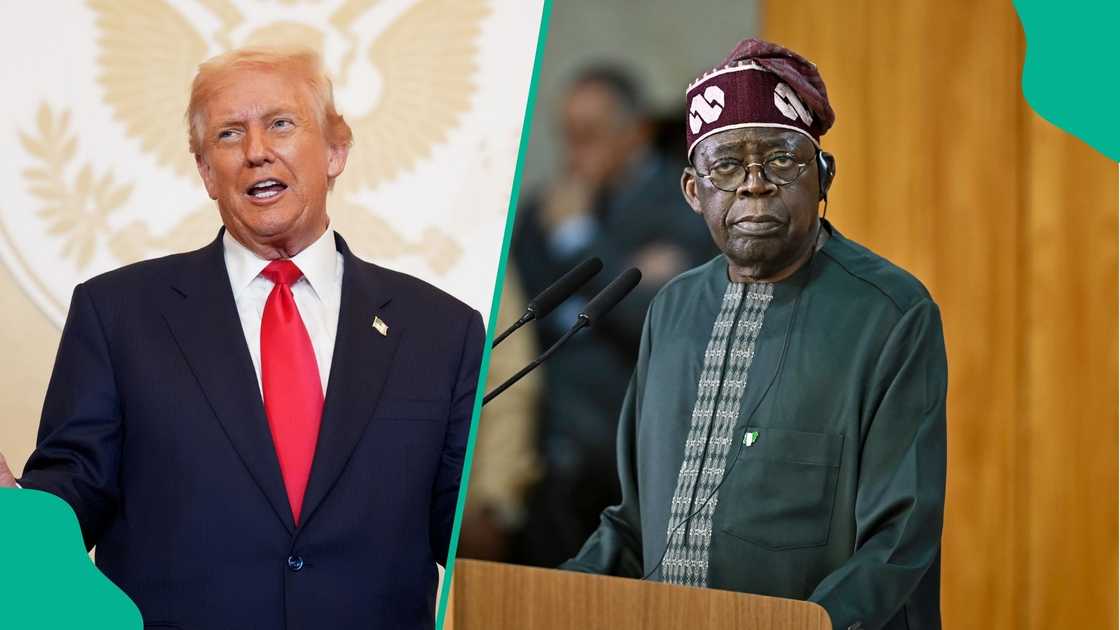
Source: Getty Images
Five steps for a grounded response
Nigeria’s challenge is not only to rebut Trump’s words, but to prove them irrelevant. That requires competence, transparency and moral authority at home. When the state protects all citizens fairly, foreign provocations lose traction. Nigeria cannot afford another reactionary cycle. It needs a proactive, dignity-driven plan that restores agency.
Lead regionally with sovereignty: Nigeria should use its ECOWAS presidency not merely as symbolism but as agenda-setting power. Define security cooperation, trade and migration frameworks that reflect mutual accountability. Let partners be partners, not puppeteers.
Anchor security in inclusion: Counter-terror efforts must be visibly inter-faith and inter-regional. When citizens across divides see themselves equally protected, legitimacy grows faster than resentment.
Speak as equals abroad: Nigeria must replace the language of dependence with that of partnership. “We appreciate support” should never sound like “we await rescue.” Diplomacy begins in vocabulary.
Rebuild national identity around citizenship: Beyond faith or region, every Nigerian must feel ownership of the republic. Institutions from recruitment boards to media should model inclusion, not tokenism.
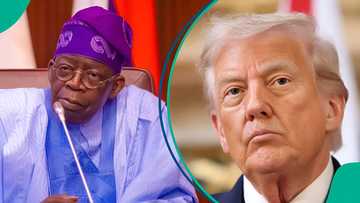
Read also
"False": Nigerian man finally breaks silence on Trump’s threat to Tinubu, makes 2 observations
Insulate elections from identity politics: INEC, civil society and media must pre-empt inflammatory narratives. Elections should be about who can govern, not who belongs.
A fork in the road
In one breath, Nigeria becomes a stage for external agendas; divided at home, pressured abroad, dependent on both. In the other, Nigeria uses this episode as a clarifying moment: to strengthen regional diplomacy, reform its economy, and rebuild trust between citizens and state. The first leads to perpetual reaction. The second to renewed leadership.
Which path Nigeria takes will depend less on what outsiders say and more on what Nigerians do next: how policymakers act, how citizens insist on dignity, how the media frames the national story. Trump’s words will fade. But Nigeria’s response, calm, principled, forward-looking, can define a generation. True power lies not in reacting to others, but in repairing ourselves
Lekan Olayiwola is a public-facing peace & conflict researcher/policy analyst focused on leadership, ethics, governance, and political legitimacy in fragile states.
Source: Legit.ng

